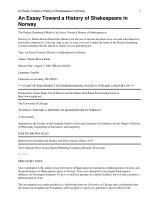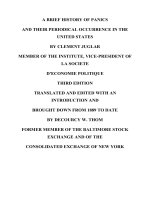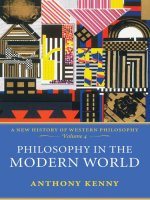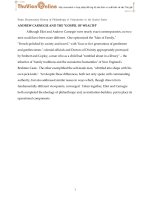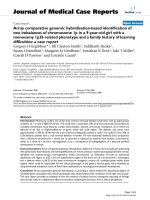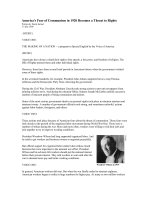A documentary history of communism in russia
Bạn đang xem bản rút gọn của tài liệu. Xem và tải ngay bản đầy đủ của tài liệu tại đây (7.49 MB, 431 trang )
A Documentary
History of
Communism
in Russia From Lenin to Gorbachev
Edited by
\
Robert V. Daniels
Tai Lieu Chat Luong
A Documentary History of
Communism in Russia
A Documentary
History of
Communism
in Russia
From Lenin to Gorbachev
Edited, with introduction, notes,
and original translations by
Robert V. Daniels
University of Vermont Press
Burlington, Vermont
Published by University Press of New England
Hanover and London
UNIVERSITY OF VERMONT PRESS
Published by University Press of New England,
One Court Street, Lebanon, N H 03766
www.upne.com
© 1993 by the Trustees of the University of Vermont
Printed in the United States of America
10 9 8 7 6 5
All rights reserved. No part of this book may be reproduced in any
form or by any electronic or mechanical means, including storage
and retrieval systems, without permission in writing from the publisher, except by a reviewer, who may quote brief passages in a review.
Members of educational institutions and organizations wishing to
photocopy any of the work for classroom use, or authors and publishers who would like to obtain permission for any of the material in the
work, should contact Permissions, University Press of New England,
One Court Street, Lebanon, N H 03766.
CIP data appear at the end of the book
ISBN-13: 987-0-87451-616-6
ISBN-IO: 0-87451-616-1
Contents
Preface ( i 9 6 0 Edition)
Preface (Revised Edition)
Preface (1993 Edition)
xiii
xv
xvii
Introduction: The Evolution of the C o m m u n i s t M i n d
—In Russia
xix
C H A P T E R O N E : Leninism and the Bolshevik Party, to 1917
3
Lenin as a Marxist: What the "Friends of the People" Are and How They Fight the
Social-Democrats (1894)
3
The Foundation of the Russian Marxist Party: Manifesto of the Russian SocialDemocratic Workers' Party (1898)
4
Lenin's Theory of the Party: What Is to Be Done? (1902)
6
Lenin on the Party Split: One Step Forward, Two Steps Back (May, 1904)
11
Marxist Reactions to Lenin—Rosa Luxemburg: Leninism or Marxism (1904)
14
Marxist Reactions to Lenin—Leon Trotsky: Our Political Tasks (1904)
16
Organization of the Bolshevik Faction: Resolution of the Twenty-Two (August,
1904)
17
Lenin on the Revolution of 1905: Two Tactics of Social-Democraq^ in the
Democratic Revolution (July, 1905)
Trotsky on "Permanent Revolution": Results and Prospects (1906)
19
23
Lenin on Democratic Centralism: Freedom of Criticism and Unity of Action (June,
1906)
25
Bogdanov's Philosophical Revision of Marxism: Empiriomonism (1905-6)
26
Lenin's Philosophical Orthodoxy: Materialism and Empiriocriticism (1908)
^°
The Purge of the Bolshevik Left Wing (June, 1909)
a) Communique on the Conference
b) Resolution on Otzovism and Ultimatism
The Ultra-Left on Lenin's Compromises: Declarations of the "Forward" Group
(i9IQ)
a) Bogdanov, "Letter to All Comrades"
32
^^
^
b) "Letter to Our Bolshevik Comrades"
34
34
35
Stalin on National Self-Determination: Marxism and the National Question (1913)
36
Lenin on the Uneven Prospects of Revolution: The United States of Europe Slogan
(August, 1915)
Bukharin on the Imperialist State: On the Theory of the Imperialist State (1916)
38
38
vi
Contents
CHAPTER TWO: The Bolshevik Revolution, 1917-1921
42
Lenin's Return to Russia: On the Tasks of the Proletariat in the Present Revolution
(April 7 [20], 1917)
42
Lenin on the Soviets: On the Dual Power (April 9 [22] 1917)
44
Lenin's Vision of the Revolutionary State: The State and Revolution
(August-September, 1917)
Lenin's Call for an Uprising: Marxism and Insurrection (September 13-14
[26-27], 1917)
47
52
The Declaration of Revolutionary Intent—Trotsky: Declaration of the Bolshevik
Fraction (October 7 [20], 1917)
54
The Decision to Seize Power: Resolution of the Central Committee, On the Armed
Uprising (October 10 [23], 1917)
55
Bolshevik Opposition to the Insurrection: Statement by Zinoviev and Kamenev
(October 11 [24], 1917)
56
The Military-Revolutionary Committee
57
Triggering the Uprising
a) Circular of the Military-Revolutionary Committee (October 24 [November
6], 1917)
b) Minutes of the Bolshevik Central Committee (October 24 [November 6],
1917)
The October Revolution: Proclamation of the Military-Revolutionary Committee
(October 25 [November 7], 1917)
59
The Soviet Government: Decree on the Formation of a Workers' and Peasants'
Government (October 26 [November 8], 1917)
Bolshevik Revolutionary Legislation
a) Decree on the Land (October 26 [November 8], 1917)
b) Decree on Suppression of Hostile Newspapers (October 27 [November 9],
1917)
c) Declaration of the Rights of the Peoples of Russia (November 2 [15], 1917)
59
60
62
62
63
63
65
66
Coalition or One-Party Government
a) Resolution of the Central Committee on the Opposition (November 2 [15],
1917)
b) Bolshevik Statements of Resignation (November 4 [ 17], 1917)
67
Industrial Democracy: Decree on Workers' Control (November 14 [27], 1917)
69
The Secret Police: Decree on Establishment of the Extraordinary Commission to
Fight Counter-Revolution (December 7 [20], 1917)
The Dissolution of the Constituent Assembly: Lenin, Draft Decree on the
Dissolution of the Constituent Assembly (January 6 [ 19], 1918)
Trotsky on the Red Army: Labor, Discipline, Order (March 27, 1918)
Lenin on Economic Expediency: The Immediate Tasks of the Soviet Government
(April, 1918)
The Left Communists on a Proletarian Economic Policy: Theses on the Present
Moment (April, 1918)
One-Party Dictatorship: Decree on the Expulsion of the Right Socialist Parties from
the Soviets (June 14, 1918)
67
68
70
71
72
74
77
80
Contents vii
Red Terror: Lenin on the Kulaks (August 11,1918)
81
War Communism: Decree on Nationalization of Large-Scale Industry (June 28,
1918)
81
Western Radicals on the Communists: Rosa Luxemburg, The Russian Revolution
(1918)
82
The Party Program of 1919
85
Centralization of the Communist Party: Resolution of the Eighth Party Congress,
On the Organizational Question (March, 1919)
The Civil War: Lenin, All Out for the Fight Against Denikin (July, 1919)
89
91
Bukharin's Apology for War Communism: The Economics of the Transformation
Period (1920)
92
Trotsky on Terror and Militarization: Terrorism and Communism (1920)
95
The "Democratic Centralists" in Opposition to Centralization: Osinsky, Minority
Report on Building the Economy, Ninth Party Congress (March, 1920)
Lenin on Revolutionary Purism: "Left-Wing" Communism: An Infantile Disorder
(April, 1920)
The Reaction against Bureaucracy: Resolution of the Ninth Party Conference, On
the Coming Tasks of Building the Party (September, 1920)
Io1
The Communist Ideal in Family Life: Alexandra Kollontai, Communism and the
Family (1920)
102
97
99
The Trade Union Controversy and the Workers' Opposition: Kollontai, The
Workers' Opposition (1921)
104
The Kronstadt Revolt: What We Are Fighting For (March 8, 1921)
107
Institution of the Monolithic Party
a) Resolution of the Tenth Party Congress, On Party Unity (March, 1921)
b) Resolution of the Tenth Party Congress, On the Syndicalist and Anarchist
Deviation in Our Party (March, 1921)
The New Economic Policy: Lenin, The Tax in Kind (April, 1921)
109
109
110
112
CHAPTER THREE: Soviet Communism: The Era of Controversy,
1922-1929
114
Protests against the New Economic Policy
a) The Declaration of the Twenty-Two (February, 1922)
b) Appeal of the "Workers' Truth" Group (1922)
114
114
115
Lenin's "Testament": Continuation of Notes (December 24, 1922)
117
Lenin on Nationality Policy: On the Question of the Nationalities or of
"Autonomization" (December 3 0 - 3 1 , 1922)
118
Lenin on the Prerequisites for Socialism: Our Revolution (January, 1923)
120
Lenin on Administrative Reform: Better Fewer, But Better (March, 1923)
121
Trotsky on Industrialization: Theses on Industry (March, 1923)
124
Formation of the Trotskyist Opposition
a) Trotsky Protests Bureaucratization (October 8, 1923)
b) Declaration of the Forty-Six (October 15, 1923)
125
125
127
viii
Contents
The "New Course" Controversy of December, 1923: Trotsky, The New Course
(December 8, 1923)
129
The Condemnation of the Trotskyist Opposition: Resolution of the Thirteenth Party
Conference, On the Results of the Controversy and on the Petty-Bourgeois
Deviation in the Party ( January, 1924)
130
The Formation of the USSR Constitution of the USSR (January, 1924)
131
Stalin on Leninism and the Party: The Foundations of Leninism (April, 1924)
133
Stalin on Socialism in One Country: The October Revolution and the Tactics of the
Russian Communists (December, 1924)
Preobrazhensky on the Economics of Industrialization: The New Economy (1926)
136
139
Soviet Cultural Policy—The Liberal Period: Resolution of the Central Committee,
On the Policy of the Party in the Field of Literature (July 1,1925)
Soviet Educational Policy—The Revolutionary Period: Pinkevich, Outlines of
Pedagogy(1927)
142
The Zinoviev-Kamenev Opposition
a) Zinoviev on State Capitalism (December, 1925)
b) Kamenev on Stalin (December, 1925)
144
144
145
The United Opposition: Declaration of the Thirteen (July, 1926)
147
Bukharin on the Opposition: The Party and the Opposition Bloc (July, 1926)
151
The Theoretical Debate on Socialism in One Country
a) Kamenev's Criticism of Stalin (November, 1926)
b) Stalin's Reply to Kamenev (November, 1926)
153
153
156
141
Stalin on the Expulsion of the Left Opposition: Report of the Central Committee to
the Fifteenth Party Congress (December, 1927)
158
Stalin on the Grain Crisis: On the Grain Front (May, 1928)
159
The Right Opposition
a) Bukharin on Peasant Policy ( July 10, 1928)
b) Bukharin on the Menace of Stalin (July 11, 1928)
Kuibyshev on Industrialization: The Economic Situation of the Soviet Union
(September 19, 1928)
162
162
163
164
Bukharin on Equilibrium: Notes of an Economist (September 30, 1928)
166
CHAPTER FOUR: The Transformation U n d e r Stalin, 1 9 2 9 - 1 9 5 3
170
Stalin's Revolution: Stalin, The Right Deviation in the CPSU(B) (April, 1929)
170
Disciplining the Intellectuals: Resolution of the Second Ail-Union Conference of
Marxist-Leninist Scientific Research Institutions, On Contemporary Problems of
the Philosophy of Marxism-Leninism (April, 1929)
173
Rakovsky on Bureaucracy
a) Letter on the Causes of the Degeneration of the Party and Governmental
Apparatus (August 2, 1928)
b) Circular of the Bolshevik-Leninist Opposition (April, 1930)
175
175
176
Stalin on the Liquidation of the Kulaks: Problems of Agrarian Policy in the USSR
(December, 1929)
177
Contents
ix
The Socialized Economy and Revolutionary Law: Pashukanis, The Soviet State and
the Revolution in Law (1930)
179
Stalin on the Ends and Means of Industrialization
a) The Tasks of Business Executives (February, 193 1)
b) New Conditions—New Tasks in Economic Construction (June, 193 1)
180
181
183
Stalin on the Sanctity of Leninism: Some Questions Concerning the History of
Bolshevism (1931)
185
The New Educational Policy: Decision of the Central Committee on the Primary
and Secondary School (September 5, 193 1)
187
The Famine of 1932-33
a) The Ukrainian Politburo on Grain Collections (November 27, 1932)
b) The Kiev Regional Bureau on Famine Relief (February 22, 1933)
188
188
189
Stalin's Social Ideal: Report of the Central Committee to the Seventeenth Party
Congress (January, 1934)
190
The New History: Decree of the Council of People's Commissars and the Central
Committee, On the Teaching of Civic History (May, 1934)
193
The New Nationalism: For the Fatherland! (Pravda, June 9, 1934)
193
Socialist Realism: Gorky, Soviet Literature (August, 1934)
195
The New Family Ideal: Discussion of the Law on Abolition of Legal Abortion
(Pravda, May 28 and June 9, 1936)
197
The Kirov Affair: Letter of an Old Bolshevik (1936)
198
Trotsky on the New Soviet Society: The Revolution Betrayed (1937)
201
The Great Purge: Stalin, On Inadequacies of Party Work and Measures for
Liquidating Trotskyist and Other Double-Dealers (March, 1927)
The Gulag: Trotskyists at Vorkuta
205
208
The Moscow Trials: The Case of the Anti-Soviet Bloc of Rights and Trotskyites
(1938)
212
The Purges and Torture: Stalin, Telegram of January 20, 1939)
216
Stalin as a Philosopher: Dialectical and Historical Materialism (1938)
217
Vyshinsky on the New Law: The Law of the Soviet State (193 8)
218
Stalin on the State and Intelligentsia: Report of the Central Committee to the
Eighteenth Party Congress (March, 1939)
The Second World War
a) Directive on Mobilization (June 29, 1941)
b) Voznesensky, The Economy of the USSR during World War II (1947)
Stalin and the Orthodox Church: Statements of the Patriarchate of Moscow
220
223
223
225
(September, 1943)
Wartime Defections: The Vlasov Movement (1944)
228
229
Stalin on the Great-Russians: Speech at Reception for Red Army Commanders (May
24, 1945)
232
Stalin's Analysis of Victory: Pre-Election Speech of February 9, 1946
232
The Zhdanov Movement: Zhdanov, Report to the Union of Soviet Writers (August,
1946)
235
x
Contents
Party Control of Science—Genetics: Resolution of the Presidium of the Academy of
Sciences of the USSR, On the Question of the Status and Problems of Biological
Science (August 26, 1948)
238
The Campaign against "Cosmopolitanism": Voprosy Istorii on the Tasks of Soviet
Historians (July, 1949)
239
Stalin on Language and Society: Marxism and Linguistics (1950)
242
The Limits of Stalinism—Malenkov on Imperfections in the Party: Report of the
Central Committee to the Nineteenth Party Congress (October, 1952)
244
CHAPTER FIVE: The Interval of Reform, 1953-1964
246
The Death of Stalin and Collective Leadership: L. Slepov, Collectivity Is the Highest
Principle of Party Leadership (April, 1953)
246
The Purge of Beria
a) The Central Committee's Indictment (July 7, 1953)
b) The Supreme Court's Verdict (December 24, 1953)
247
248
249
The Rise of Khrushchev: The Virgin Lands Program (February, 1954)
250
The Fall of Malenkov: Malenkov's Statement of Resignation (February 8, 1955)
253
"De-Stalinization": Khrushchev, Secret Speech at the Twentieth Party Congress
(February, 1956)
254
The "Thaw" in Cultural Life: Voprosy Filosofti on the Theater, (October, 1956)
The "Anti-Party Group": Resolution of the Central Committee (June 29, 1957)
The Promise of a Communist Future: Program of the Communist Party of the
Soviet Union (November, 1961)
"Harebrained Schemes"—Khrushchev's Division of the Party Apparatus: Resolution
of the Central Committee of the CPSU, On the Development of the USSR
Economy and Reorganization of Party Guidance of the National Economy
(November 23, 1962)
258
263
265
273
The Fall of Khrushchev (October 6, 1964)
a) Suslov's Secret Speech
b) Communique of the Central Committee (October 14, 1964)
275
275
279
CHAPTER SIX: The "Era of Stagnation"
280
The Promise of the Brezhnev Era: Report of the Central Committee to the
Twenty-Third Party Congress (March, 1966)
280
The End of the Thaw—The Sinyavsky-Daniel Trial: D. Yeremin, "Turncoats"
(January, 1966)
284
The Attempt at Economic Reform
a) Liberman's Proposal (September, 1962)
b) The 1965 Reform (1967)
286
286
288
Currents of Dissent
a) Liberal Dissent—Sakharov
b) Conservative Dissent—Solzhenitsyn
c) Marxist Dissent—Medvedev
d) Suppression of Dissent—Andropov (November 15, 1976)
290
291
293
297
301
Contents
xi
Soviet Consumerism: Kosygin, Report on the Directives of the Twenty-Fourth Party
Congress for the Five-Year Plan, 1971— 1975 (April, 1971)
302
The Scientific-Technical Revolution: Directives of the Twenty-Fourth Party Congress
on the Five-Year Plan (April 1971)
304
Soviet Jews and the Emigration Issue
a) Samizdat on Discrimination and Assimilation
b) The Emigration Tax
307
307
311
Brezhnev's Constitution: Brezhnev, Report on the Draft Constitution (June, 1977)
313
The Theory of "Developed Socialism": Brezhnev, A Historic Stage on the Road to
Communism (1977)
314
Population and the Birthrate: D. Valentei and A. Kvasha, Population Problems and
Demographic Policy (19 81)
316
The Limits of Centralism: Trapeznikov, Management and Scientific and Technical
Progress (May, 1982)
318
The Impasse in Agriculture: V. Miloserdov, New Stage in the Management of the
Agro-Industrial Complex (August, 1982)
321
Absorption of the National Minorities: " W e are the Soviet People" (1982)
323
The Andropov Succession
a) Andropov on the Economy
325
325
b) Andropov on Marx and the Laws of Socialism
326
The Gathering Crisis: The "Novosibirsk Report" (August, 1983)
33 1
The Chernenko Interlude: Chernenko's Speech to the Central Committee (February,
I9 8 4)
334
CHAPTER SEVEN: Perestroika and the E n d of C o m m u n i s m ,
1985-1991
Gorbachev and Reform
a) Restructuring—Gorbachev's Speech to the Central Committee (April, 1985)
b) Glasnost—Gorbachev and the Writers (June, 1986)
c) Challenging the Party—Gorbachev at the Central Committee, January 1987
d) Reopening the Past—Gorbachev's Anniversary Speech (November, 1987)
337
337
337
339
341
347
Conservative Reaction: The Andreyeva Letter (March 13, 1988)
352
Democratization
a) The September Revolution (1988)
b) The Congress of People's Deputies (May, 1989)
c) "Democratic Platform" (January, 1990)
d) The Presidency and the End of the Communist Monopoly (March,
1990)
e) Yeltsin and the Russian Republic
354
354
356
361
362
364
Marxism Rejected: Tsipko, "The Roots of Stalinism" (1988-89)
366
Economic Crisis: The "500 Days" Plan (August, 1990)
371
Cracks in the Union
a) Declarations of Sovereignty (March-June, 1990)
b) The Union Treaty (March ,1991)
373
374
375
xii
Contents
The Communist Party of the Russian Republic (June, 1990)
377
The Last Party Program (July, 1991)
379
The August Putsch (1991)
a) The Committee on the State of Emergency
b) Yeltsin's Defiance
c) Gorbachev's Return to Power
d) Gorbachev's Resignation as General Secretary
e) Suppression of the CPSU
The End of the Soviet Union (December, 1991)
a) The Commonwealth of Independent States
b) Gorbachev's Resignation as President
383
383
386
387
388
388
389
389
390
Preface (i960 Edition)
It would naturally be impossible in one volume of documentary materials to cover a subject as broad and complex as Communism from every point of
view. The careful description of political institutions, events and everyday life as
they have proceeded over the years under Communism would require whole shelves
of source materials. The present work has been deliberately focused on the subject
of Communist thought and doctrine, for reason of its commanding importance, its
relative uniformity within the Communist scheme of things, and the appropriateness of the documentary approach to its elucidation. We will be primarily concerned with the evolution of top-level guiding ideas, policies and intentions among
the Communists. Statements of deviators of all sorts are included along with the
official line of those in power—we may regard anyone who claims descent from
Lenin as equally meriting the label "Communist." Through the pronouncements of
its leading figures, both those who have ruled and those who have fallen from
grace, we may arrive at a reasonably approximate picture of what Communism actually is, historically considered.
The problems of selecting materials for a purpose such as this never permit a
fully satisfactory solution. I have attempted a fair digest and representative choice
of statements expressing all the main concepts and currents in Communism. Many
readers, however, will find that their areas of interest are underrepresented. This
failing is the price that must be paid in an effort to survey the entire Communist
movement in one documentary volume, and meet the needs of the student, the
general reader, and the scholar who is not a specialist in this field.
The present work would never have materialized without the assistance of many
people who helped in its preparation or who paved the way with their own studies.
I am indebted to the many publishers who kindly permitted me to reprint selections of previously translated material (individually acknowledged under each
item). Certain documentary collections which have been particularly helpful deserve special mention—the pioneering Documentary History of Chinese Communism,
by Conrad Brandt, Benjamin Schwartz and John K. Fairbank (Harvard University
Press, 1952); the Materials for the Study of the Soviet System, by James H. Meisel and
Edward S. Kozera (The George Wahr Publishing Co., Ann Arbor, Michigan,
1950), which brings together a wide selection of previously translated Soviet documents; the documentary compilations prepared by the Legislative Reference Service of the Library of Congress; the various collections of Soviet documents
published by the Stanford University Press; and the English editions of the selected
works of Lenin and Stalin, published by the Foreign Languages Publishing House
in Moscow. The Harvard University Library has kindly permitted me to include my
translations from a number of hitherto unpublished documents in the Trotsky Archive. For their suggestions regarding documents on Far Eastern Communism I am
xiv
Preface (i960 Edition)
indebted to Professors Justus M. van der Kroef and George T. Little, and to Professor Little and Professor Lewis S. Feuer I am grateful for many helpful criticisms.
To Mr. Nathan Glazer I wish to express my appreciation for initially encouraging
me to undertake this project, and for his editorial assistance since that time. Mrs.
Joyce McLaughlin of the Inter-Library Loan Department of the University of Vermont Library rendered me invaluable service in locating and obtaining many scarce
but important publications. The vast work of transcribing and assembling the documentary materials was ably done by Mrs. Madeline Chaplin, Mrs. Jean Falls, Mrs.
Phyllis Reservitz, Mrs. Roberta Stetson, and my wife, Alice Daniels.
Preface (Revised Edition)
Since the publication of the original edition of this work more than
two decades ago the subject of Communism has expanded in years, in territory, and
in complexity. In the present revision I have endeavored to respond to these
changes by abridging the pre-1960 material of the first edition and adding new selections to reflect recent developments in the various Communist parties both inside and outside the Soviet Union. To facilitate the interest of users in focusing
either on internal Soviet history or on the evolution of Soviet foreign policy and
Communist movements outside the USSR, the new edition has been organized
into two volumes, each devoted to one of these aspects of Communism and proceeding chronologically. Both original material and the post-1960 additions have
been divided accordingly, and the portion of the i960 introduction pertaining to
external issues has been placed in volume 2.
With the increasing scope and diversity of the subject of Communism it has become more difficult than ever to achieve a totally satisfactory and representative
selection of documents within a reasonable compass. To comply with spatial limitations, items in the original edition have been culled where their retrospective importance is not crucial in mapping the development of the Communist movement.
A few new pre-1960 items have been added. Post-1960 material has been selected
with emphasis on illustrating the main internal developments in the Soviet Union,
the most significant events in Soviet foreign relations and the chief variants among
Communist movements outside the Soviet Union. As in the original edition,
statements representing the views of dissenters within Communist countries are included together with the official views of the leadership. Though many points of
particular interest inevitably remain unrepresented, I hope the reader will find that
the overall usefulness of this collection has been substantially enhanced.
For their support in the initiation of this revised edition I am indebted to Mr.
Thomas McFarland, Director of the University Press of New England, Professor
Henry Steffens of the Editorial Board of the Press and Dean Robert Lawson of the
Graduate College of the University of Vermont. In the compilation of new material
for this edition I have been greatly aided by the vast resources of Soviet documentation made available since the 1950's by the Current Digest of the Soviet Press and its
companion series, Current Soviet Policies. I wish to thank Professor Stephen Cohen
and Mr. Orest Pelech of Princeton University for locating for me the hitherto unpublished "Secret Speech" by Suslov in 1964. I am grateful to Mrs. Carolyn Perry,
Mrs. Penni Bearden, Mrs. Susan Lacy, and Mrs. Claire Sheppard for their able assistance in preparing new portions of the manuscript.
Preface (1993 Edition)
This third, revised and updated edition of A Documentary History of
Communism coincides with the amazing collapse of Communist rule in the Soviet
Union. It follows the fall of Communist governments in Eastern Europe and the
virtual demise of the international Communist movement, except for the People's
Republic of China and a few other outposts of old-style Communism in the Far
East and in Cuba whose days may be numbered. Thus the story of Communism as
a worldwide phenomenon is now essentially closed, and there will be no need for
further revisions of this work.
While this new edition reflects the startling developments in the Communist
world since the advent of reform under Mikhail Gorbachev in 1985, I have found
no need to make other major changes either of concept or of content. Communism
has become history, but that history is still a living background to post-Communist
life. In fact, the historical understanding of Communism has become all the more
important with the tendency since the collapse of the Soviet Union, among outsiders as well as among Russians and the other ex-Soviet peoples, to regard the entire
Communist experience from 1917 to 1991 as an undifferentiated nightmare, better forgotten than studied. This attitude threatens to create a new historical "black
hole" that could swallow up the true record as indiscriminately as the Communists
themselves did when it came to their enemies. The post-Communist world can only
be understood as Communism left it and as the end-product of a complex evolution, where verbal professions of reality, recorded in these documents, squared less
and less with the actual course of affairs.
Since 1985 mountains of new documentation about the history of Communism
in the Soviet Union and in Eastern Europe have become available. After the collapse of Communist rule in Moscow following the August Putsch of 1991, the
most sensitive party archives were thrown open to investigators, and an intriguing
sample of these documents was exhibited by the Library of Congress in cooperation with the Committee on Archival Affairs of the Russian Government. None of
these materials, however, fundamentally alters the picture of Communist reality
that outside experts were able to form on the basis of the known record. At most
they add detail—frequently gruesome—and bear out historians' conjectures. As of
this writing, the post-coup revelations have not equalled in historical import the
key documents published in Soviet journals and East European sources between
1987 and 1991, after Gorbachev gave the green light to historical reconsideration.
I have added or substituted some of this newly available material, both published
and unpublished, where it makes certain points more emphatically, but the basic
record still stands.
This story closes with the dissolution of the Soviet Union and the resignation of
President Gorbachev, following the effective suppression of the Communist Party
xviii
Preface (/ggj Edition)
in all the Soviet republics. These events put an end to anything that could even
nominally be called Communism in the former Soviet realm. What has happened
since then and may happen in the future in Russia and the other formerly Soviet
republics is no longer the history of Communism but of the post-Communist era,
the subject for other books by other authors.
For their help in initiating and executing this final revision of A Documentary
History of Communism I am indebted to Thomas McFarland of UPNE (once again),
to Dr. James Billington and his staff of the Library of Congress, to Doug Paton
for research assistance on short notice, and to Mrs. Diann Varricchione, who processed the new portions of the manuscript.
I have followed the rule here of capitalizing "Communism" and "Communist"
when they refer to the political movement and system, using lower case when they
refer to the theoretical ideal. Similarly, "Soviet," referring to the country or the
system, "soviet," referring to the actual councils (except "St. Petersburg Soviet,"
etc.).
Introduction
The Evolution of the Communist Mind-In Russia
The subject of this work is the world-wide movement which was initially
brought into being by Vladimir Ilich Lenin when he organized his Bolshevik faction of Russian revolutionaries in the years 1902-1904. Earlier doctrines and
movements going under the name "communism" are not of concern except as they
were relevant to the thinking of the specific contemporary Communist movement
founded by Lenin and developed in Russia after the revolution of 1917. This applies particularly to the philosophy of Marx and Engels, of which Russian Communism was by no means a simple, uncomplicated application (nor the only school of
followers, for that matter). Marxism is of interest here insofar as, and only so far
as, it contributed to Communist thought, policies and problems. By itself, Marxism is wholly inadequate either to define or explain the Communist movement.
The Communist Movement and Communist Doctrine
There is one essential point on which the whole matter of the correct understanding of Communism rests. Contrary to every assertion, the Communist movement is not truly described by its doctrine. Broadly speaking, the doctrine is a
picture of history, past, present and future, which gives the present movement that
definite place which was forecast by the original authors of the picture a century
ago. Very strong doubts can be cast upon the present validity of the picture as a
whole. But it can be shown beyond any reasonable question that within the terms
of the Marxist picture itself, the present Communist movement does not occupy
the place which its official spokesmen ascribe to it. As a picture of Communist society and a map of its intentions, Communist doctrine is not a free and honest approach to the apprehension of reality, but a forced political imposition.
It is accordingly necessary for anyone who wants to understand Communism to
look beneath the doctrine and to question all the assumptions which it casts in the
way of a clear view. The lack of correspondence between theory and reality will
then become readily apparent. This divergence of statement and fact is actually one
of the basic features of the Communist movement as it now exists, and it dictates
in turn another prime Communist characteristic—the institution of complete control of communication and expression, in order to sustain the irrelevant theoretical
picture which it is in the nature of Communism to demand. The Communist mentality can be described in essence as a compulsively self-justifying opportunism,
where the leaders assume full freedom of action but insist on squaring every step
with the holy verities of Marxism-Leninism.
Since Communist doctrine has been so far abstracted from reality, it can well be
asked why the doctrinal statements of the movement are worth studying. What, indeed, can be the value of putting forth a collection of Communist ideological pro-
xx
Introduction
nouncements like the present one, if the real nature of the movement is neither
expressed nor governed by its doctrine? Taken at their face value these doctrinal
statements can be quite misleading; the reader must bear in mind the context and
learn the habit—essential to every student of Communism—of reading between the
lines. Doctrine has always been extremely important to the Communist movement,
though for a long time not in its literal sense. An awareness of the evolving use and
reinterpretation of doctrine is basic in appreciating how the movement has developed. The documents are thus primarily useful for the pursuit of historical understanding, which is the only way to comprehend how the movement acquired the
paradoxical characteristics which it now displays.
Marx and the Russians
Communist thought cannot be understood apart from Marx, but neither can it
be understood on a simple, unqualified Marxist basis. The intellectual origins of
the movement must be approached as an interaction of Marx's ideas and the political and intellectual setting of p re-revolutionary Russia in which they took root. The
circumstances in which Marxism became popular in Russia in the 1890's belie the
expectations of the theory itself. Russia was not a capitalistic country with a proletariat ripe for revolution; it was just beginning to experience the change and dislocation which accompany the initial stages of industrialization. For decades, however,
Russia had possessed a class of energetic and articulate intellectuals who devotedly
embraced each new radical or Utopian idea that came to them from Europe. Marx
himself recognized this fashion among the Russians, and commented sardonically
that they "always run after the most extreme that the West can offer. . . . This
does not prevent the same Russians, once they enter State service, from becoming
rascals."* Revolutionary elements among the Russian intelligentsia were primed to
respond to any revolutionary doctrine from the West. When Marxism became
known to them, they devotedly embraced it in large numbers.
The intellectual success of Marxism had nothing to do with its logical applicability to Russia. It was difficult to apply it at all, as Marx realized: "The 'historical
necessity5 of . . . capitalist production . . . is explicitly restricted to the countries
of Western Europe "t Rigorously construed—as Marx's Russian disciples construed
it—Marxism could give scant hope for an early proletarian revolution in Russia.
The expectation for a country at the Russian stage of development was a "bourgeoisdemocratic revolution" and an extended period of capitalistic industrial development, before Russia would follow the socialist course that her West-European
neighbors were supposed to initiate. For the immediate future Marxism would
serve more appropriately as an ideological justification of capitalism, and in fact the
theory did have considerable appeal in Russia on just this basis, among the socalled "legal Marxists."
Among the revolutionaries in Russia, Marxism could not appeal on logical
grounds. People did not become revolutionary after an intellectual conversion to
*Marx to Kugelman, October 1, 1868, in Letters to Dr. Kugelman (New York, International
Publishers, 1934), pp. 7 7 - 7 8 .
fMarx to Vera Zasulich, March 8, 1881, in Blackstock and Hoselitz, eds., The Russian Menace
to Europe (Glencoe, Illinois, The Free Press, 1952), p. 278.
Introduction
xxi
the Marxian historical analysis. They became Marxists—in Russia as everywhere
else—because they were revolutionary for prior emotional reasons and because
Marxism appealed to them on emotional grounds as a pseudo-scientific rationale
for revolution. Logical inconsistency was no obstacle. Marxism in Russia has from
the very beginning neatly fit Marx's own definition of ideology as "false consciousness"—a set of ideas used without concern for truth or consistency to rationalize
the interests and aims of a particular social group. Marxism became the "ideology"
of a large part of the revolutionary Prussian intelligentsia. Since the revolution it
has fulfilled the same function for the ruling Communist Party.
Lenin, in this context, represents simply the clearest and most extreme example
of emotional commitment to Marxism in disregard of its incongruence in Russia.
Lenin had grown up with the burning revolutionary ardor so familiar among the
scions of the educated gentry. He embraced Marxism with religious devotion, as
the ultimate word in human affairs, almost as a supernatural prophecy which no
mortal could dare question or modify without committing the sin of blasphemy.
Despite this dogmatism, however, Lenin was quite capable of ignoring or violating
Marxian principles when it came to the actual formulation of revolutionary programs and tactics. Lenin's program and tactics did not come from Marx at all, but
from his own emotional make-up as a member of the Russian revolutionary intelligentsia, and from the previous traditions of the revolutionary movement in Russia.
Lenin's Marxism was superimposed upon his Russianism, to supply the terminology and conviction of righteous inevitability.
While we cannot understand Lenin as a Marxist, the study of his theoretical
pronouncements and his tactical statements does contribute basic understanding
about the Communist movement. What we have to deal with is in reality a new
doctrine—Leninism—which, while observing the Marxian language and professing
spiritual continuity from Marx, actually contradicted him in many vital respects.
Leninism as a system of belief has had a very profound effect in shaping the Communist movement, and so it is the natural starting point for any analysis of modern
Communism.
The Premises of Leninism
Lenin's political thinking rested on two cardinal assumptions, neither of which
bore any logical relation to Marxism. One of these implicit beliefs was his conception of the overall nature of the historical process: that history is made in the last
analysis not by classes or the forces of production, but by willful individual leaders
and by ideas. This was an outlook he shared with practically all pre-Marxist Russian
social thinkers. Lenin had assimilated it so deeply that he was scarcely conscious of
its import, so that he could go right on resting his thought on such an assumption
while he imagined himself to be a perfectly orthodox Marxist. Time and again
Lenin railed against "spontaneity" and proclaimed the vital role of "consciousness."
He made it abundantly clear that he never expected the working class to carry out a
revolution by itself. Only the deliberate leadership of dedicated "professional revolutionaries" like himself could bring the event about.
In his emotional orientation toward revolution Lenin shared a trait with the unscientific aspect of Marx's outlook which did not follow logically from his theoretical system. This was what might be called the moral imperative of revolution.
xxii
Introduction
Lenin, like Marx, was dedicated to the anticipated revolution as a moral absolute,
as a sort of purgative judgment day which would extirpate all the evil in the old
way of life, and usher in the millenium. For both Marx and Lenin, all questions of
good and evil hinged on the ultimate question of revolution. They differed, however, in the manner in which they sustained their hopes about revolution. Marx's
solution was that of pseudo-scientific inevitability; having committed himself to the
moral necessity for the revolutionary reconstruction of society, he proceeded to
work out an elaborate, sweeping, in many respects brilliant system of social analysis
which purported to prove the inevitability of that prospective upheaval: the relentless dialectic of historical materialism would sooner or later raise the chosen class
of proletarians to the seats of power.
Lenin followed all this verbally, but the actual foundation which he established
for his revolutionary goal was in fact diametrically opposed to Marx's. For Lenin
the revolution was not inevitable at all; it had to be brought about by the deliberate
action of conscious revolutionaries, against the natural flow of history. If the spontaneous forces of history were not interfered with, Lenin implied, the moral imperative of revolution would never become a reality. Hence it was on willful
revolutionaries, sustained by a sense of moral duty, that Lenin had to rest his
hopes. How guarantee, however, that the revolutionaries would keep striving in the
right direction against the frustrating spontaneity of the passive herd? Lenin's
answer was the same on which any religious movement relies to assure individual
rectitude: the proper doctrine, the true faith.
The proper doctrine was Marxism as read by Lenin. Any questioning of the
doctrine or of Lenin's own interpretation of it—in fact, any independence of mind
at all—not only disqualified a member of the revolutionary movement but classified
him irretrievably with the enemies of the revolution, as far as Lenin was concerned.
Lenin and his followers were sustained by an absolute faith in Marx's revolutionary
prophecy, with all its pseudoscience of dialectical inevitability. It mattered not that
the doctrine of inevitability contradicted the philosophy of will and idea which all
of Lenin's political practice implied, for the Bolsheviks were revolutionaries before
they were Marxists. They displayed the Calvinistic paradox of people who believed
in a foreordained future but who, thanks to this belief, were all the more vigorously determined on individual action to make that future come true. The psychological truth here is that people with a strong emotional impulse toward a given
goal are irrationally inclined to embrace a doctrine that says that that goal is inevitably going to be realized
The emotional commitment to strive mightily for a revolution that was regarded
as inevitable had significant moral implications for the Bolsheviks: it allowed them
to conclude without qualms that the end justifies any means. Like the Russian extremists who preceded them, the Bolsheviks regarded the revolution as the alldecisive event, the leap from the kingdom of Evil to the kingdom of Good.
Nothing had any value or made any sense except in relation to the revolution. But
the revolution could not be passively awaited, according to the Bolshevik philosophy; it required a total commitment and the utmost exertion by those morally
committed to it to make it a reality. Therefore, it was morally binding upon the adherents of revolution to employ every expedient means, not excepting violence,
falsehood, robbery and treachery, to prepare and consummate the revolutionary
victory. All such questionable tactics could be utilized with equanimity because the
Introduction
xxiii
expected revolution would be all-decisive in governing the high moral level of the
new society; it would wipe away any evil effects of evil means presently used
The grave defect in this reasoning was the lack of assurance that the revolution—i.e., the right kind of revolution, the real revolution—would actually follow
from the revolutionaries' action and offset the expedient evils employed by them.
How know that the present evil means would assuredly procure the future good?
For this foundation to their righteousness the Bolsheviks had to depend on the
Marxian inevitability of the proletarian revolution and the classless society. However, it was precisely the lack of real conviction about such inevitability that required them to adopt evil expedients in the first place. Far from being corrected in
the revolution which actually took place, the Bolsheviks' system of violent, authoritarian and deceitful expedients rapidly became an end in itself; it is now the basis
of the Communist social order.
The Party as the Instrument of Revolution
The major contribution which Lenin made to the theory and practice of Communism was by way of implementing his belief in the moral imperative of a historically uncertain revolution. He had to have reliable means for accomplishing a
problematical political goal, and he found them in a feature which had been a distinguishing trait of the earlier Russian revolutionary movements—the stress on
conspiratorial organization, the revolutionary party. The party represents the essence of Leninism.
The function of the party, as Lenin conceived it, was to force the revolution to
occur, against all the resistance of the old order. The party would overcome the
impracticality of the intellectuals and the formless spontaneity of the masses and
drive for a victory which otherwise would never materialize. For this instrument of
revolution Lenin had in mind forms of organization, dictated both by the circumstances of the political underground and by his own proclivities, from which he
never deviated. First of all, the party was to be a narrow organization, not the mass
of like-minded sympathizers, but the active and conscious minority, the professional revolutionaries. This was the specific issue over which the factional split of
the Russian Social Democrats into Bolsheviks and Mensheviks began in 1903. For
the accomplishment of its revolutionary objective Lenin required that this minority
organization be constituted on military lines, with a hierarchy of command and
binding discipline upon its members. The formula which he proposed to guide the
party organization was "democratic centralism," meaning the democratic determination of policy and the centralized execution of it. In practice, however, Lenin
could brook no expression of policy contrary to his own thinking; anyone who differed with Lenin found himself attacked as "opportunist" or "petty bourgeois," an
unreliable element if not a potential traitor to the revolutionary cause. Lenin recognized none as genuine proletarian Marxists save those who unreservedly followed his own leadership. Thus, while the notion of a one-party dictatorship was
never explicitly formulated before the Bolsheviks came to power, the exclusion of
all who differed had already been long implicit in the monopoly of revolutionary
morality which in practice Lenin ascribed to himself.
There is irony in the fact that when the Bolsheviks took power in October,


